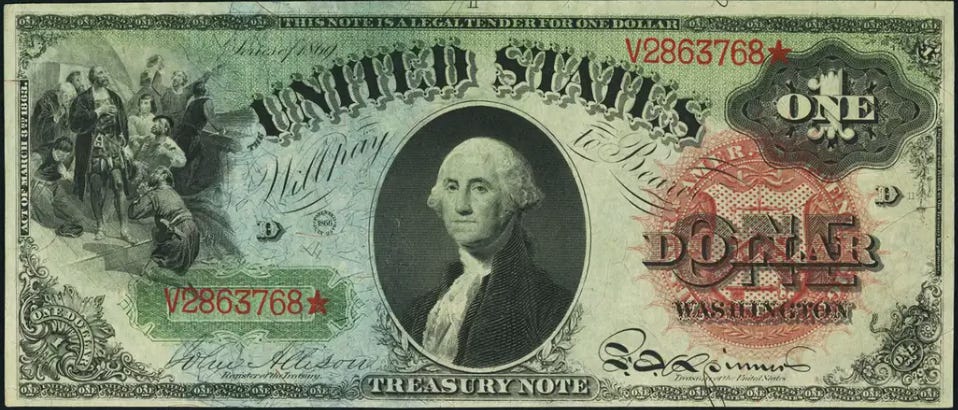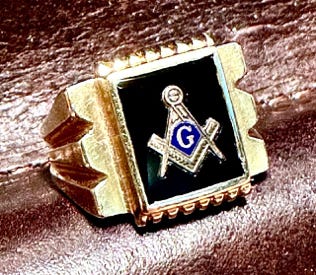
On Presidents Day we think mostly of George Washington, whose birthday we used to celebrate by scarfing cherry pie (he didn’t tell a lie) on 22 February until his own personal holiday a) became subject to the 1968 Uniform Monday Holiday Bill and then b) in 1971 got transformed into Presidents Day to honor both Washington and Abraham Lincoln, whose birthday is February 12th.
In California the holiday is spelled Presidents’ Day (apostrophe after the s) to honor all U.S. presidents.
For the sake of this column let’s stick with “The Father of His Country,” who was an ardent Freemason, inducted at age 21 on the 4th of November 1752 into Masonic Lodge No. 4 in Fredericksburg, Virginia.
Benjamin Franklin was a founding member of the first American Freemason lodge in 1730, two years before George Washington was born. The Boston Tea Party saboteurs who sparked the inciting incident of the Revolutionary War were Masons, along with Paul Revere, famous for sounding the alarm when the Redcoats were coming. Moreover, all 33 of Washington’s generals were Freemasons. That number itself is interesting because of its many mystical meanings, not least the Masonic 33rd Degree, reputed to be the highest level one may attain in that secret society’s hierarchy.
French historian Bernard Fay saw Freemasonry as “the spiritual father of political revolutions” in France and the colonies. And Sidney Morse, a 19th century American journalist, reported that “Masonry brought together in secret and trustful conference the patriot leaders.” Freemasons, he wrote, “dominated the Continental Congress.”
Although George Washington never actually lived in his namesake city, as president he and his Masonic architects designed the “Federal City” in accordance with Masonic code, utilizing Masonic ceremony, ritual, and regalia, for laying cornerstones. Which of course is what Masons do: They cut stones and build secret chambers—and use a bunch of quirky handshakes to recognize one another for gaining entry.
U.S. Presidents who doubled as Masons include Teddy and Franklin Roosevelt (FDR), Andrew Jackson, Harry Truman, and Gerald Ford. It was FDR who added the Masonic pyramid with all seeing eye to the iconic one-dollar bill which, when Washington’s countenance first appeared on it in 1869, could buy $22.67 worth of goods or services in today’s money.
The Society of the Cincinnati
Our first president was also a founding member (and president-general) of another fraternal order, The Society of the Cincinnati, named after Roman statesman Lucius Cincinnatus, who relinquished dictatorial control not once but twice (in 458 BC and 439 BC) in favor of returning to his farm.
George admired such humility and surprised his own countrymen by following Lucius’s example not only for his refusal to be crowned king after defeating the British but also his unwillingness to seek a third term as president and instead return to a private life at his beloved Mount Vernon. Washington was apparently concerned that if he were to die in office his successors might come away with the erroneous assumption that their election could be stretched into a lifetime appointment.
When news of Washington’s retirement reached England’s King George III, from whom our American Cincinnatus wrestled the colonies, the astounded king is reputed to have said, “If he does that, he will be the greatest man in the world.”
110 Rules
Washington took his Masonic membership as seriously as the new country he presided over and even wrote up 110 Rules For Freemasons in Life and Lodge, transcribed from maxims originally created by 16th century French Jesuit priests—making it one of the earliest self-improvement manuals.
To celebrate and honor George Washington today, here is a handful of his aphorisms:
‘”Tis better to be alone than in bad company.” There is a vast difference between being alone and aloneness. The former is sad, the latter, heavenly—especially if company would be nuts and dolts.
“Be not angry at the table whatever happens.” Worth bearing in mind at Thanksgiving.
“Read no letters, books or papers in company.” In today’s world, there goes your smart phone; best powered off and out of sight (good luck with that).
“Spit not in the fire, nor put your hands into the flames to warm them, nor set your feet upon the fire especially if there be meat before it.”
“If you soak bread in the sauce, let it be no more than what you put in your mouth.”
Addressing the Grand Lodge of Massachusetts in 1793, Washington defined the objective of Masonry: “To promote the happiness of the human race.”
According to the World Happiness Report, the United States ranks only 19th in happiness, behind all Scandinavian countries, the UK, Ireland, Costa Rica, and a dozen others.
Which means that lodges in the USA are on the wane and need to step up their efforts.
Code Name 711
The secret of Washington’s Revolutionary War victory lay in his mastery of the craft of intelligence, taught to him by French deserters and Native Americans, on whose side he fought for the Brits against France during the French and Indian War.
Thus, early into the war Washington created the Culper Spy Ring for espionage against the redcoats, who had sacked and then occupied New York City. In the codebook of Washington’s spymaster, Benjamin Tallmadge (a Freemason, of course), Washington’s codename number was 711.
(If you’ve ever wondered how 7-Eleven got its name, maybe there’s a Masonic connection to consider—thus hatching a new conspiracy theory…)
His Farewell Address
Washington is also remembered for his Farewell Address to the Nation, in which the retiring president made three important (if lately forgotten) points:
1) Unity. Focus on common interests rather than differences.
2) Loyalty to political party over country is the worst enemy.
3) “Steer clear of permanent alliances with any portion of the foreign world” as a means of staving off “foreign influence and corruption.”
If alive today to witness the trifecta contravention of his message, not to mention the diminished influence of Freemasonry (and diminished happiness), George would probably not have a very happy birthday.
And the painful dentures he wore (not wooden as popular lore suggests but crafted from donkey teeth) would likely preclude him from blowing out 292 candles.
Lodge #192
Saint Barbara is the patron saint of bricklayers and masons so it is entirely appropriate that Freemasonry should have a presence here—and it does: Masonic Lodge #192, founded in 1868.
Members have included such distinguished Santa Barbarians as “Worshipful Master” John Stearns (of Stearns Wharf fame), Dr. William Sansum (Sansum Clinic), Dwight Murphy (father of Old Spanish Days Fiesta) and Thomas Storke, who in addition to helping establish Santa Barbara Airport and promoting Lake Cachuma as Santa Barbara’s main source of water, was publisher of the Santa Barbara News-Press.
Sadly, this Lodge’s glory days are over. Laments a member, “Only around 40 Masons attend meetings—a far cry from when SB had three lodges and 600 members.”
And maybe that’s why everything has gone to hell in a handbasket.
Full disclosure: My maternal grandfather, Edward Stanley, was a Freemason. My mother, who gifted me his Masonic ring, once told me her father was devoted to the Lodge. When he was buried, in 1959, fellow Freemasons provided him with a most dignified and heartfelt sendoff.



Thank you, Eringer. Especially the historical connection between “Roman statesman Lucius Cincinnatus, who relinquished dictatorial control not once but twice (in 458 BC and 439 BC) in favor of returning to his farm.”
I did not know that and am better informed now having read your article! 😃
Well written, good info…Happy Presidents’ Day!
FYI… https://anonfamous.substack.com/p/the-secret-societies-of-all-45-us